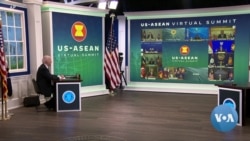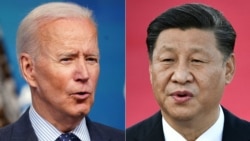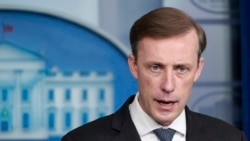U.S. President Joe Biden on Tuesday rebooted his country’s lapsed relationship with the Association of Southeast Asian Nations by attending the annual meeting of the 10-member bloc virtually and announcing plans to provide up to $102 million to expand the U.S. strategic partnership in the Indo-Pacific region.
“Our partnership is essential in maintaining a free and open Indo-Pacific, which has been the foundation of our shared security and prosperity for many decades,” Biden said in his opening remarks delivered from the White House as leaders of nine of the 10 nations listened. “And the United States strongly supports the ASEAN outlook and the Indo-Pacific — on the Indo-Pacific and the rules-based regional order.”
The last U.S. president to attend an ASEAN-U.S. meeting was in 2017 when Donald Trump attended in Manila.
This year’s summit is hosted by Brunei. The other members of the regional bloc are Cambodia, Indonesia, Laos, Malaysia, Myanmar, the Philippines, Singapore, Thailand and Vietnam.
Myanmar was not allowed to attend — the group banned its military junta leader for ignoring a peace road map agreed to six months ago.
Biden underscored the importance of ASEAN and called the relationship a “linchpin for maintaining the resilience, the prosperity, and security of our shared region.”
The White House said the new funding will go toward health, climate, economic and education programs.
Included in the package is $40 million that will go to an initiative to help address the current COVID-19 pandemic and strengthen ASEAN's ability to prevent, detect and respond to future outbreaks of infectious diseases.
Another $20.5 million will finance climate mitigation, and up to $20 million will support cooperation on trade and innovation. Another $17.5 million is earmarked for education projects, and $4 million to promote gender equality and equity.
US-China rivalry
The summit is the first time in four years that an American president participated at the top level with an economically dynamic regional bloc seen as key to countering an increasingly assertive China.
Marc Mealy, senior vice president for policy at the U.S.-ASEAN Business Council, said he welcomes Biden’s re-engagement. “We're talking about a region that by 2030 is going to be one of the largest regional economies in the world,” he said.
While the United States is seen as a security guarantor against rising Chinese ambition in the region, Washington is lagging behind Beijing in terms of economic ties. According to ASEAN data, the bloc became China’s largest trading partner in 2020.
ASEAN and China are also part of the world’s biggest free trade agreement, the Regional Comprehensive Economic Partnership. The U.S. is not part of the deal, which covers nearly 30% of the global economy.
The U.S. is also left out of the Comprehensive and Progressive Agreement for Trans-Pacific Partnership, a free trade agreement formerly known as the Trans-Pacific Partnership. The 2016 TPP was promoted by former president Barack Obama but Trump withdrew from it in 2017.
“On several issues, whether it's trade or climate, the United States plays an important role in setting the table, and then sometimes leaves the table,” said Prashanth Parameswaran, a fellow at the Wilson Center's Asia program.
He pointed out that geographically, Washington is at a disadvantage and will need to work harder to win ASEAN support at the same time that regional players, including China, Japan, South Korea and Australia, are eager to step in.
“When you raise the bar, and then you subsequently walk away, there's a double disadvantage,” Parameswaran said.
In recent years, the U.S.-China rivalry in Southeast Asia has intensified significantly. The Biden administration is continuing the Free and Open Indo-Pacific strategy in the region, which singles out Beijing for pursuing regional hegemony.
But most members of ASEAN refuse a binary choice between the U.S. and China and underscore the need to cooperate with both, while ensuring freedom of navigation, including in the Taiwan Straits.
“What's the benefit for conflict happening in that area? Who gets the benefit?” Indonesian Coordinating Minister for Maritime Affairs and Investment Luhut Pandjaitan said to VOA. “Nobody. COVID is enough (to) create the problem,” he said.
Where’s Myanmar?
Although Myanmar did not attend the ASEAN meeting, U.S. officials said the delicate state of that nation was part of discussions. In February, the military deposed the elected government and jailed its leader amid allegations of electoral fraud in last November’s elections.
In April, participants agreed on a five-point plan that called for an immediate end to violence and sent a special ASEAN envoy to the country, formerly known as Burma.
National Security Adviser Jake Sullivan said that the bloc, with the help of the U.S., is trying to reach a regional solution. On Monday, he said he met virtually with officials from Myanmar’s government-in-exile.
“We discussed broader diplomacy with key countries in the region and those with influence on the military junta, and how the United States could send strong messages to those countries, as well,” he said. “And in fact, just this morning, President Biden has participated in the U.S.-ASEAN Summit, and ASEAN has taken the step of denying a seat at that summit to the junta leader.”
That exclusion, Parameswaran said, was no mere formality.
“I think it's a significant move,” he said. ... In a virtual setting, you literally had a screen where Myanmar was a blank screen while the meeting was going on. And I think this is a very sort of vivid signal from ASEAN. I think the jury remains out on how ASEAN manages this challenge. I mean, the fact remains that when ASEAN admitted Myanmar into the grouping, they were very aware of these challenges, and they decided to keep Myanmar in rather than keeping Myanmar out. So, this is something which ASEAN can't sort of sweep under the rug and sort of say this is a Myanmar problem. It is a Southeast Asia problem. It is an ASEAN problem.”
What’s next?
Sullivan told VOA that the U.S. will continue to support ASEAN’s five-point plan to bring about a solution.
“We will continue to stay focused on our steadfast support for the people of Burma for a democratic path in Burma,” he said. “And for the protection of the safety, security and human rights of the citizens.”
On to the G-20
In a way, these meetings form a preview for the administration’s vow to conduct “aggressive diplomacy.” What that looks like in practice is likely to come into focus in the coming days, as Biden heads to Rome on Thursday for the meeting of the world’s 20 wealthiest nations, known as the G-20. And from there, to the 26th United Nations climate summit in Glasgow.
“President Biden and key European partners will sit down at these two summits to coordinate policies on Iran, on supply chains, on global infrastructure efforts and so much else,” Sullivan said.
He noted that two of the world’s top leaders who won’t attend the summits in person could affect the outcome.
“Neither China nor Russia will be attending the summit in person at the leader level, largely, it seems, due to COVID-19,” Sullivan said. “The U.S. and Europe will be there. They'll be there energized and united at both the G-20 and at COP26, driving the agenda, shaping the agenda as it relates to these significant international issues.”
Eva Mazrieva, Virginia Gunawan contributed to this report.










